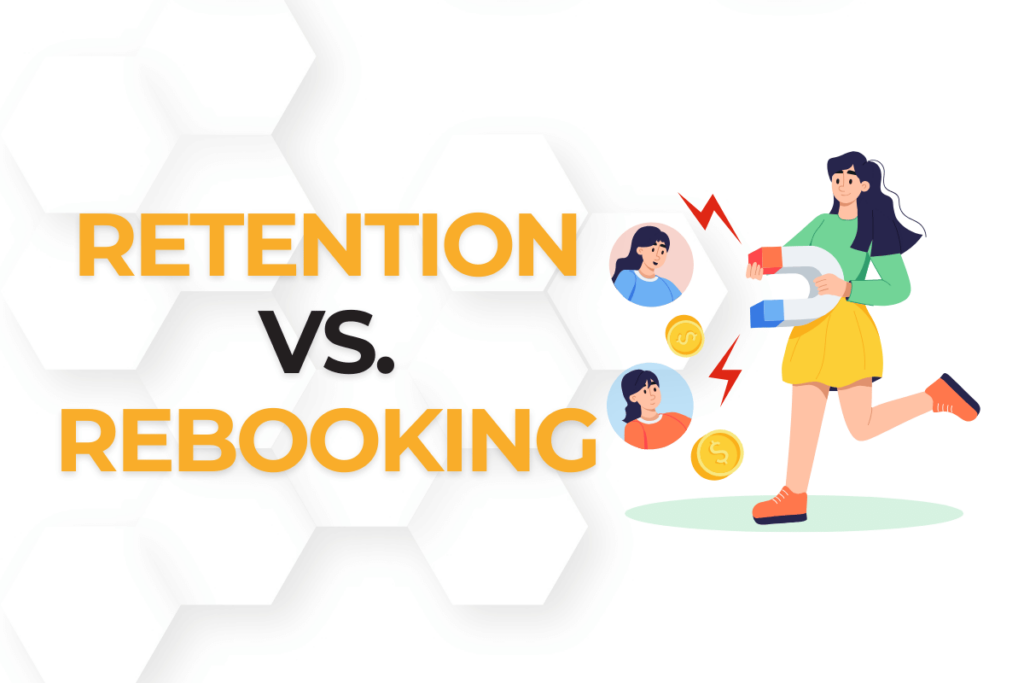Why Balancing Retention and Rebooking is Key to Long-Term Clinic Success
In today’s highly competitive massage therapy industry, clinic owners face the ongoing challenge of balancing two crucial metrics: retention and rebooking. While both are essential for maintaining a thriving, sustainable practice, many clinic owners struggle to strike the right balance. Retention refers to building long-term relationships with clients who return for treatments regularly, whereas rebooking focuses on securing future appointments before clients leave your clinic. Mastering both is essential because focusing too heavily on one without the other can lead to missed opportunities for growth.
The value of finding this balance cannot be overstated. Studies show that improving client retention by just 5% can increase profits by as much as 95%. This powerful statistic underscores how critical it is not only to rebook clients for their next session but to foster long-term loyalty that keeps them returning for years. The key to unlocking sustained growth and profitability lies in understanding the unique dynamics of both metrics and applying tailored strategies to excel in each area.
In this article, we’ll explore the differences between retention and rebooking, highlight common mistakes clinics often make, and offer actionable strategies you can implement today. By mastering these elements, you’ll position your clinic for long-term success, build stronger client relationships, and create a loyal, repeat customer base that supports sustainable business growth.
Retention vs. Rebooking: What’s the Difference?
Defining Retention
Retention refers to your ability to keep clients returning over a long period, often measured by months or years. It’s the foundation for building a loyal client base that consistently invests in your services, providing a steady flow of revenue and strengthening your clinic’s reputation for reliability.
Defining Rebooking
Rebooking is the process of securing the next appointment before the client leaves your clinic. While essential for maintaining a full schedule and ensuring short-term income, rebooking alone does not guarantee long-term client loyalty.
Why Both Matter
Overemphasizing rebooking can inadvertently create a sales-driven atmosphere, making clients feel pressured to schedule their next appointment before they’re ready. This can turn the relationship transactional, where clients may rebook short term but fail to establish a lasting connection with your clinic, ultimately reducing long-term loyalty. Conversely, focusing solely on retention without actively securing future appointments can result in gaps in your schedule, leading to unpredictable cash flow and underutilized staff time.
Finding the right balance between rebooking and retention is essential for sustainable growth. Rebooking ensures consistent short-term revenue and helps maintain a full schedule, while retention fosters long-term client relationships that provide stability and higher lifetime value. By strategically integrating both practices, you can create a client experience that feels natural and supportive rather than forced, encouraging clients not only to return but to continue booking sessions in a way that benefits their wellness and your clinic’s profitability.
Achieving this balance requires a combination of clear communication, personalized care, and thoughtful follow-up strategies. When done effectively, you’ll create a cycle of trust and satisfaction that keeps clients coming back while maintaining a steady flow of appointments that supports your clinic’s financial health.
Common Mistakes Clinics Make
1. Overemphasizing Rebooking
One of the most common pitfalls massage clinics fall into is making rebooking the sole focus of every client interaction. While securing the next appointment is important for maintaining cash flow, an overemphasis on rebooking can shift the client experience from therapeutic to transactional. When clients feel that their appointment is more about locking in the next session than addressing their immediate needs, it can lead to dissatisfaction and, ultimately, a decline in trust. Clients may rebook once or twice, but without feeling genuinely valued and cared for, they are likely to seek care elsewhere.
Solution: Rebooking should feel like a natural extension of the client’s treatment plan, not a hard sell. Train your therapists to communicate the benefits of ongoing care based on each client’s individual needs, ensuring that rebooking feels like a personalized recommendation rather than a sales tactic.
2. Failing to Act on Feedback
Client feedback is one of the most underutilized resources in the massage therapy industry. Whether through surveys, online reviews, or in-person conversations, feedback provides invaluable insights into your clients’ experiences. Unfortunately, many clinics either don’t actively seek feedback or, worse, ignore it when received. This can lead to unresolved issues—such as dissatisfaction with a specific therapist or service—that quietly erode client retention.
Solution: Implement a consistent feedback system and make it part of your regular operational review. Address issues as they arise and use positive feedback to reinforce what’s working well. Not only does this show clients that their opinions matter, but it also allows you to continuously improve the quality of your services.
3. Not Tracking Metrics
Your retention and rebooking rates are more than just numbers—they are critical indicators of your clinic’s overall health. Unfortunately, many clinics operate without closely monitoring these key metrics, which leads to a lack of insight into what’s working and where improvements are needed. Without proper tracking, you may overlook opportunities to strengthen client relationships or miss patterns that could enhance efficiency and profitability.
Solution: Invest in a reliable client management system that allows you to track both retention and rebooking rates. Regularly review these metrics and use them to make data-driven decisions. For example, if you notice a drop in retention for certain therapists, it could signal the need for additional training or support. Metrics help identify weaknesses and celebrate successes.
4. Inconsistent Client Experience
Another common mistake is inconsistency in the level of service provided by different therapists. Clients expect a certain standard when visiting your clinic, and variations in service quality can disrupt their experience and negatively impact both retention and rebooking rates. For instance, if a client has an exceptional experience with one therapist but a subpar one with another, they may feel less inclined to return.
Solution: Standardize your processes and ensure all therapists are trained to deliver a consistent experience. From the initial greeting to post-session care, every aspect of the client’s journey should reflect your clinic’s commitment to quality.
Understanding the Metrics: How to Measure Retention and Rebooking
Retention Rate
Your retention rate is the percentage of clients who return for services over a specific period. It’s a crucial metric for determining how well your clinic builds long-term relationships and maintains client satisfaction. To calculate retention, divide the number of returning clients by the total number of clients seen during that timeframe.
However, it’s important to consider the average client frequency when evaluating your retention rate. Different clinics have varying appointment cadences based on client demographics and service offerings. Some clients may visit weekly, while others return monthly or even quarterly. Calculate your clinic’s average frequency of visits—the typical time between appointments for returning clients.
Once you know the average frequency, set a timeframe for evaluating retention that aligns with your clients’ natural appointment habits. For example, if your average client visits once every six weeks, measuring retention over a six-month period will give a more accurate reflection of your clinic’s ability to maintain long-term loyalty.
Key Tip: A higher retention rate, especially when paired with an understanding of client frequency, suggests strong client satisfaction and loyalty. Regularly tracking this metric allows you to identify patterns, predict future revenue more accurately, and address any potential issues before they affect your bottom line.
Rebooking Rate
Your rebooking rate is the percentage of clients who book their next appointment before leaving the clinic. This metric is essential for maintaining a steady stream of future appointments and ensuring that your schedule stays full and your revenue remains consistent. To calculate your rebooking rate, divide the number of clients who rebook by the total number of clients seen during a specific period.
For even more insight into client commitment and adherence to recommended treatment plans, consider tracking rebooking within 72 hours of their last appointment. This timeframe is particularly useful for monitoring clients who may not rebook immediately but follow up shortly after receiving home care instructions or treatment recommendations. Tracking rebooking within this window helps you gauge how well clients are following through with home care plans and ongoing treatments—critical factors in improving long-term outcomes and satisfaction.
Key Tip: A high rebooking rate, especially when monitored in combination with the 72-hour follow-up window, reflects both client satisfaction and their commitment to maintaining their health between sessions. Regularly reviewing these metrics will give you a clearer understanding of how effectively your clinic is encouraging ongoing care and client engagement.
Tools to Track Metrics
Using software that tracks both retention and rebooking rates can provide valuable insights. Regularly review these metrics and identify patterns that highlight strengths and areas for improvement.

Retention Strategies: How to Build Long-Term Client Loyalty
Consistency is Key
Ensure that every therapist delivers a consistent experience. Clients need to trust that no matter who they see, they’ll receive high-quality care. This consistency builds trust, which is crucial for long-term retention.
Personalization Makes a Difference
Personalized care is a major driver of retention. Tailor each session based on the client’s history, preferences, and health goals. This makes clients feel valued and understood, increasing their likelihood of returning.
Follow-Up Communication
Staying in touch between appointments is critical. Send follow-up emails with helpful tips or reminders of the benefits of regular massage. A simple check-in shows clients you care about their well-being beyond the clinic walls.
Gather and Act on Feedback
Implement a feedback system that allows clients to share their experiences. Whether it’s a quick survey or a more in-depth follow-up, showing clients that you value their opinions can improve loyalty and service quality.
Boosting Rebooking: Proven Techniques for Securing the Next Appointment
Upselling the Future Benefits
During each session, therapists should highlight how regular treatments support clients’ long-term health goals. Emphasize the benefits they’ll experience if they return consistently.
Educating Clients on Continuous Care
Clients often see massage as a one-time solution to their problems. Educate them on the importance of continuous care for maintaining their health and well-being. A well-informed client is more likely to rebook.
Timing is Everything
Encourage therapists to ask clients to rebook when they’re feeling the most relaxed and satisfied—this is often at the end of their session. This positive moment increases the likelihood of a “yes.”
Automate Rebooking Reminders
Automated reminders via email or text can significantly boost rebooking rates. Set up a system that follows up with clients who haven’t rebooked within a certain time frame to keep your schedule full.
Retention and Rebooking in Harmony: Creating a Balanced Approach
Training Staff for Success
Your staff should understand the value of both retention and rebooking. Train them to prioritize client satisfaction first, then naturally guide clients toward rebooking. Striking the right balance ensures that clients return for the long haul while keeping your schedule full in the short term.
Track and Adjust
Regularly review your retention and rebooking rates to gauge the effectiveness of your strategies. Use this data to make informed adjustments, ensuring continued growth and client satisfaction.
Case Study: How One Clinic Improved Retention and Rebooking Simultaneously
One massage clinic found that while their rebooking rate was high, they struggled with long-term retention. After implementing a client feedback loop, personalized follow-up communication, and consistent service delivery across all therapists, the clinic saw a 20% increase in retention and a 15% boost in rebooking rates over six months.

Actionable Steps to Implement Today
- Review Your Metrics: Start by analyzing your current retention and rebooking rates.
- Implement Client Feedback Loops: Set up a system to gather and act on client feedback.
- Train Your Team: Ensure your staff knows how to balance retention and rebooking effectively.
- Enhance Client Communication: Use follow-up emails, newsletters, and reminders to keep clients engaged between appointments.
Building a Profitable, Sustainable Practice
Retention and rebooking aren’t mutually exclusive; in fact, they work best together. While retention ensures clients remain loyal and return over time, rebooking keeps your schedule consistently filled, generating immediate revenue. When these two elements work in harmony, they create a cycle of client engagement and satisfaction that drives both short-term and long-term business growth.
The key to integrating retention and rebooking lies in focusing on exceptional client experiences. When clients feel truly cared for—both during and after their session—they’re more likely to return and rebook. Consistency in service quality across therapists plays a huge role in this; every visit should meet or exceed client expectations, no matter who they see or what treatment they receive. Consistent service builds trust, which is the cornerstone of client retention.
Additionally, timing is everything when it comes to rebooking. Encouraging clients to rebook at the right moment—typically when they’re most satisfied at the end of their session—helps ensure they stay on track with their wellness plan. This isn’t about pressuring clients, but about helping them recognize the value of regular treatments in meeting their health goals. By framing rebooking as part of a long-term plan for their well-being, you position your clinic as an essential partner in their self-care journey.
Finally, tracking both retention and rebooking rates allows you to fine-tune your strategies and address any gaps in client engagement. Regular monitoring of these metrics helps you understand what’s working, where you may be losing clients, and how you can adjust your approach to maximize both retention and rebooking. By leveraging both metrics in harmony, you can build a more profitable, sustainable practice that not only attracts new clients but also retains them for years to come.
FAQ
An ideal retention rate depends on your specific business goals, but a retention rate of 60-80% is typically a strong benchmark for most massage therapy clinics.
Focus on upselling the benefits of regular massage, educate clients on the importance of continuous care, and train your staff to ask for the rebooking at the right time—often at the end of the session when clients are most satisfied.
Rebooking ensures short-term income by filling your schedule, while retention builds long-term client loyalty, leading to sustained revenue and business growth. Balancing both is key to a successful clinic.
There are various software solutions available, such as clinic management systems or scheduling tools, that allow you to track client data, appointment histories, and retention/rebooking rates.



